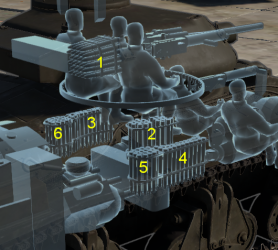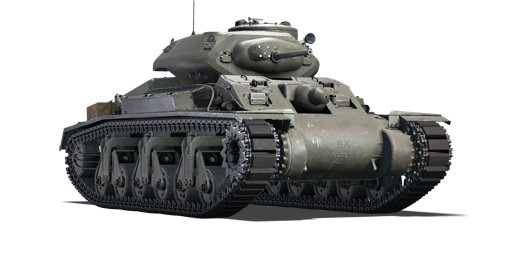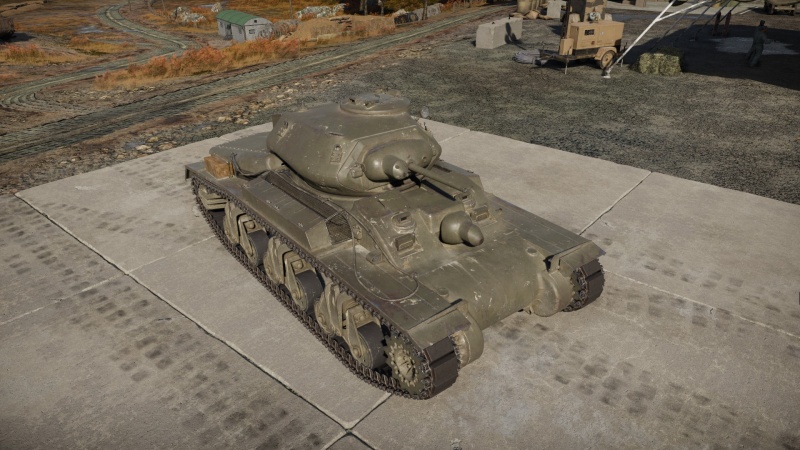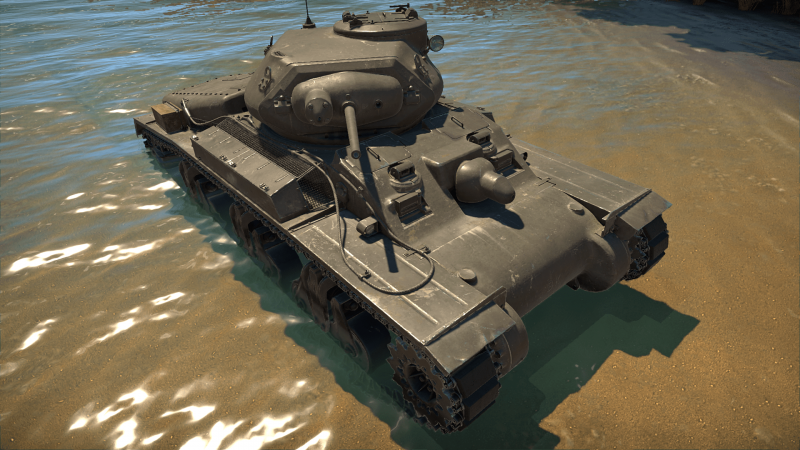Difference between revisions of "A.C.I"
m (→See also) (Tag: Visual edit) |
(→Description) |
||
| (2 intermediate revisions by 2 users not shown) | |||
| Line 6: | Line 6: | ||
== Description == | == Description == | ||
<!-- ''In the description, the first part should be about the history of the creation and combat usage of the vehicle, as well as its key features. In the second part, tell the reader about the ground vehicle in the game. Insert a screenshot of the vehicle, so that if the novice player does not remember the vehicle by name, he will immediately understand what kind of vehicle the article is talking about.'' --> | <!-- ''In the description, the first part should be about the history of the creation and combat usage of the vehicle, as well as its key features. In the second part, tell the reader about the ground vehicle in the game. Insert a screenshot of the vehicle, so that if the novice player does not remember the vehicle by name, he will immediately understand what kind of vehicle the article is talking about.'' --> | ||
| − | The ''' | + | The war with the Axis powers demanded ever-increasing investments from all members of the British Commonwealth. Australia was no exception, as it faced the threat of a Japanese invasion. In response, in 1940, work began in Australia on the development of its own tank. Development and construction of the vehicle were delayed due to the country's underdeveloped industry and increasing army demands, resulting in the first prototype being ready only by January 1942, followed by a second in March. Around this time, the tank was named '''Australian Cruiser Mark I "Sentinel"''', or shortened to '''A.C.I'''. Prototypes underwent tests until January 1943, with serial production commencing even before their completion in November 1942. A total of 65 vehicles were produced by June 1943, but they were not adopted for service due to serious technical problems identified during testing. Coupled with the rise in [[M4]] production in the USA and the redirection of Australian industry towards supporting Allied forces, this led to the cancellation of the Australian tank program. |
| + | |||
| + | The only "action" in which the A.C.I participated was its appearance in the 1944 film "Rats of Tobruk", where it was used as a stand-in for German tanks. Currently, three surviving examples are held in collections at the Bovington Museum, Puckapunyal Military Museum, and the Australian Armour and Artillery Museum. | ||
| + | |||
| + | The '''A.C.I''' was introduced during [[Update "Winged Lions"]] as a reward for the [[wt:en/news/7469-event-operation-w-i-n-t-e-r-en|2021 Operation W.I.N.T.E.R.]] event. Originally conceived as a cruiser tank, the A.C.I shares characteristics more akin to British infantry tanks such as the [[Matilda III]] and [[Valentine I]]. The frontal armour of the hull is thick and well-angled, with one vulnerable spot in its centre covered by a developed machine gun shield. Side armour is notably weaker, but sufficient to allow angling the hull to improve protection. The turret also boasts robust armour. However, it's important to remember that the A.C.I can still encounter tanks capable of penetrating its defences. Furthermore, its armament is underwhelming: the gun has low penetration and post-penetration damage, though somewhat mitigated by a high rate of fire. Mobility is also subpar; the tank accelerates slowly and struggles to reach its maximum speed. | ||
== General info == | == General info == | ||
| Line 12: | Line 16: | ||
{{Specs-Tank-Armour}} | {{Specs-Tank-Armour}} | ||
<!-- ''Describe armour protection. Note the most well protected and key weak areas. Appreciate the layout of modules as well as the number and location of crew members. Is the level of armour protection sufficient, is the placement of modules helpful for survival in combat? If necessary use a visual template to indicate the most secure and weak zones of the armour.'' --> | <!-- ''Describe armour protection. Note the most well protected and key weak areas. Appreciate the layout of modules as well as the number and location of crew members. Is the level of armour protection sufficient, is the placement of modules helpful for survival in combat? If necessary use a visual template to indicate the most secure and weak zones of the armour.'' --> | ||
| − | In general, the A.C.I is very good at head-on engagements, due to its very well armoured front for its BR. The sides are with a thickness of only around 45 mm relatively | + | In general, the A.C.I is very good at head-on engagements, due to its very well armoured front for its BR. The sides are with a thickness of only around 45 mm relatively easy to penetrate at its BR. Tanks using large-calibre HE shells are dangerous, because of the overpressure mechanics that will often take out the driver and the machine gunner as well as the transmission. The lower front is quite vulnerable, if shot, the transmission will most likely break down, the crew won't take damage usually. |
'''Armour type:''' <!-- The types of armour present on the vehicle and their general locations --> | '''Armour type:''' <!-- The types of armour present on the vehicle and their general locations --> | ||
Latest revision as of 19:44, 28 August 2024
Contents
Description
The war with the Axis powers demanded ever-increasing investments from all members of the British Commonwealth. Australia was no exception, as it faced the threat of a Japanese invasion. In response, in 1940, work began in Australia on the development of its own tank. Development and construction of the vehicle were delayed due to the country's underdeveloped industry and increasing army demands, resulting in the first prototype being ready only by January 1942, followed by a second in March. Around this time, the tank was named Australian Cruiser Mark I "Sentinel", or shortened to A.C.I. Prototypes underwent tests until January 1943, with serial production commencing even before their completion in November 1942. A total of 65 vehicles were produced by June 1943, but they were not adopted for service due to serious technical problems identified during testing. Coupled with the rise in M4 production in the USA and the redirection of Australian industry towards supporting Allied forces, this led to the cancellation of the Australian tank program.
The only "action" in which the A.C.I participated was its appearance in the 1944 film "Rats of Tobruk", where it was used as a stand-in for German tanks. Currently, three surviving examples are held in collections at the Bovington Museum, Puckapunyal Military Museum, and the Australian Armour and Artillery Museum.
The A.C.I was introduced during Update "Winged Lions" as a reward for the 2021 Operation W.I.N.T.E.R. event. Originally conceived as a cruiser tank, the A.C.I shares characteristics more akin to British infantry tanks such as the Matilda III and Valentine I. The frontal armour of the hull is thick and well-angled, with one vulnerable spot in its centre covered by a developed machine gun shield. Side armour is notably weaker, but sufficient to allow angling the hull to improve protection. The turret also boasts robust armour. However, it's important to remember that the A.C.I can still encounter tanks capable of penetrating its defences. Furthermore, its armament is underwhelming: the gun has low penetration and post-penetration damage, though somewhat mitigated by a high rate of fire. Mobility is also subpar; the tank accelerates slowly and struggles to reach its maximum speed.
General info
Survivability and armour
In general, the A.C.I is very good at head-on engagements, due to its very well armoured front for its BR. The sides are with a thickness of only around 45 mm relatively easy to penetrate at its BR. Tanks using large-calibre HE shells are dangerous, because of the overpressure mechanics that will often take out the driver and the machine gunner as well as the transmission. The lower front is quite vulnerable, if shot, the transmission will most likely break down, the crew won't take damage usually.
Armour type:
| Armour | Front (Slope angle) | Sides | Rear | Roof |
|---|---|---|---|---|
| Hull | ___ mm | ___ mm Top ___ mm Bottom |
___ mm | ___ - ___ mm |
| Turret | ___ - ___ mm Turret front ___ mm Gun mantlet |
___ - ___ mm | ___ - ___ mm | ___ - ___ mm |
| Cupola | ___ mm | ___ mm | ___ mm | ___ mm |
Notes:
Mobility
| Game Mode | Max Speed (km/h) | Weight (tons) | Engine power (horsepower) | Power-to-weight ratio (hp/ton) | |||
|---|---|---|---|---|---|---|---|
| Forward | Reverse | Stock | Upgraded | Stock | Upgraded | ||
| Arcade | 54 | 7 | 26 | 527 | 649 | 20.27 | 24.96 |
| Realistic | 49 | 6 | 301 | 340 | 11.58 | 13.08 | |
Modifications and economy
Because it is a premium tank, the A.C.I comes with all its modifications already researched.
Armaments
Main armament
| 40 mm QF 2-pounder | Turret rotation speed (°/s) | Reloading rate (seconds) | |||||||||||
|---|---|---|---|---|---|---|---|---|---|---|---|---|---|
| Mode | Capacity | Vertical | Horizontal | Stabilizer | Stock | Upgraded | Full | Expert | Aced | Stock | Full | Expert | Aced |
| Arcade | 130 | -10°/+20° | ±180° | N/A | 28.6 | 39.5 | 48.0 | 53.1 | 56.5 | 3.64 | 3.22 | 2.97 | 2.80 |
| Realistic | 17.9 | 21.0 | 25.5 | 28.2 | 30.0 | ||||||||
Ammunition
| Penetration statistics | |||||||
|---|---|---|---|---|---|---|---|
| Ammunition | Type of warhead |
Penetration @ 0° Angle of Attack (mm) | |||||
| 10 m | 100 m | 500 m | 1,000 m | 1,500 m | 2,000 m | ||
| Shot Mk.1 AP/T | AP | 72 | 68 | 52 | 37 | 27 | 19 |
| Shell Mk.2 | HE | 9 | 8 | 7 | 6 | 6 | 5 |
| Shot Mk.IXB APCBC/T | APCBC | 89 | 86 | 77 | 66 | 57 | 50 |
| Shell Mk.1 AP/T | APHE | 66 | 62 | 49 | 36 | 26 | 20 |
| Shell details | ||||||||||||
|---|---|---|---|---|---|---|---|---|---|---|---|---|
| Ammunition | Type of warhead |
Velocity (m/s) |
Projectile mass (kg) |
Fuse delay (m) |
Fuse sensitivity (mm) |
Explosive mass (TNT equivalent) (g) |
Ricochet | |||||
| 0% | 50% | 100% | ||||||||||
| Shot Mk.1 AP/T | AP | 792 | 1.08 | - | - | - | 47° | 60° | 65° | |||
| Shell Mk.2 | HE | 687 | 1.34 | 0.1 | 0.1 | 85 | 79° | 80° | 81° | |||
| Shot Mk.IXB APCBC/T | APCBC | 792 | 1.24 | - | - | - | 48° | 63° | 71° | |||
| Shell Mk.1 AP/T | APHE | 792 | 1.08 | 1.2 | 9 | 20.9 | 47° | 60° | 65° | |||
Ammo racks

| Full ammo |
1st rack empty |
2nd rack empty |
3rd rack empty |
4th rack empty |
5th rack empty |
6th rack empty |
Visual discrepancy |
|---|---|---|---|---|---|---|---|
| 130 | 104 (+26) | 81 (+49) | 59 (+71) | 37 (+93) | 19 (+111) | 1 (+129) | No |
Notes:
- As they are modeled by sets of 2 or 3, shells disappear from the rack only after you've fired all shells in the set.
- To go into battle with the turret empty of shells, pack 59 (+71) shells (racks 1 & 2 depleted).
Machine guns
| 7.7 mm Vickers | ||||
|---|---|---|---|---|
| Mount | Capacity (Belt) | Fire rate | Vertical | Horizontal |
| Coaxial | 4,250 (250) | 390 | N/A | N/A |
Usage in battles
The A.C.I's sloped frontal armour is great in medium range skirmishes since it will bounce most shots. The weak gun however forces you to come close to your targets to get a chance to penetrate. The armour is best used in combination with the A.C.I's good mobility.
Notable enemies include the Panzer III, the Marder III H and the early T-34s.
Pros and cons
Pros:
- Diversely sloped frontal hull armour is sturdy against common foes, like M3A3 Stuart and M5 Stuart, T-50
- Outstanding gun depression, allowing hull-down tactics
- Can easily frontally engage most enemies
- Fast reload allows quick follow-up shots
Cons:
- Only 44 mm of side armour
- Painfully slow reverse speed of -4 km/h
- Tightly packed crew
- Frontal turret armour is quite weak
- Slow acceleration
History
Describe the history of the creation and combat usage of the vehicle in more detail than in the introduction. If the historical reference turns out to be too long, take it to a separate article, taking a link to the article about the vehicle and adding a block "/History" (example: https://wiki.warthunder.com/(Vehicle-name)/History) and add a link to it here using the main template. Be sure to reference text and sources by using <ref></ref>, as well as adding them at the end of the article with <references />. This section may also include the vehicle's dev blog entry (if applicable) and the in-game encyclopedia description (under === In-game description ===, also if applicable).
Media
- Skins
- Videos
See also
Related development:
Vehicles of similar configuration or role:
External links
| New South Wales Railway Company | |
|---|---|
| Medium tanks | A.C.I · A.C.IV |
| Britain medium tanks | |
|---|---|
| Valentine | Valentine I · Valentine IX · Valentine XI |
| Cromwell | Cromwell I · Cromwell V · Cromwell V (RP-3) |
| Cromwell derivatives | Challenger · Avenger · Comet I · Comet I "Iron Duke IV" · Charioteer Mk VII |
| Centurion | Centurion Mk 1 · Centurion Mk.2 · Centurion Mk 3 · Centurion Mk.5 AVRE · Centurion Mk 10 · Centurion Action X · FV4202 |
| Vickers MBT | Vickers Mk.1 · Vickers Mk.3 · Vickers Mk.7 |
| Chieftain | Chieftain Mk 3 · Chieftain Mk 5 · Chieftain Mk 10 |
| Challenger 1 | Challenger Mk.2 · Challenger Mk.3 · Challenger DS |
| Challenger 2 | Challenger 2 · Challenger 2 (2F) · Challenger 2 TES · Challenger 2 OES · Challenger 2E · Challenger 2 Black Night |
| Challenger 3 | Challenger 3 TD |
| Australia | A.C.I · A.C.IV · Centurion Mk.5/1 |
| South Africa | Olifant Mk.1A · Olifant Mk.2 · TTD |
| India | Vijayanta · Bhishma TWMP |
| Israel | ▄Sho't Kal Dalet |
| Jordan | Khalid |
| Sweden | ▄Strv 81 (RB 52) |
| USA | Grant I · Sherman II · Sherman Firefly · Sherman IC "Trzyniec" |
| Britain premium ground vehicles | |
|---|---|
| Light tanks | A13 Mk I (3rd R.T.R.) · A13 Mk II 1939 · AEC Mk II · Crusader "The Saint" · Rooikat 105 |
| Medium tanks | A.C.I · Grant I · Cromwell V (RP-3) · Sherman IC "Trzyniec" · A.C.IV · Comet I "Iron Duke IV" |
| Centurion Mk.2 · ▄Strv 81 (RB 52) · Centurion Mk.5 AVRE · Centurion Mk.5/1 · ▄Sho't Kal Dalet · Centurion Action X | |
| Vijayanta · Khalid · Challenger DS · Challenger 2 OES | |
| Heavy tanks | Independent · Matilda Hedgehog · Excelsior · TOG II · Churchill Crocodile · Black Prince |
| Tank destroyers | Alecto I · Achilles (65 Rg.) · QF 3.7 Ram |






